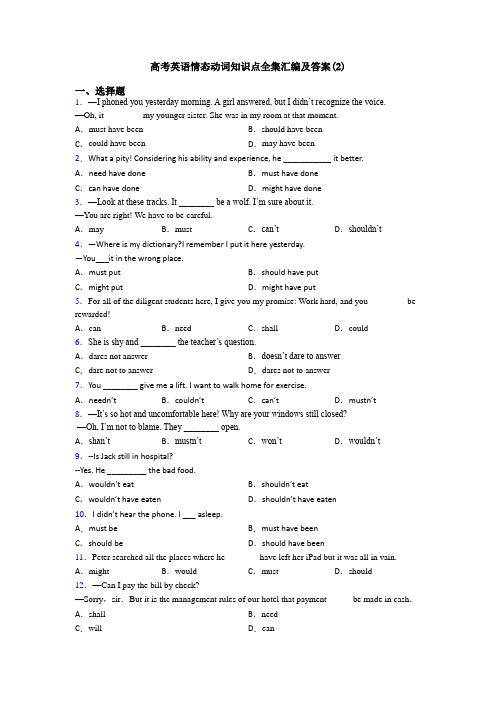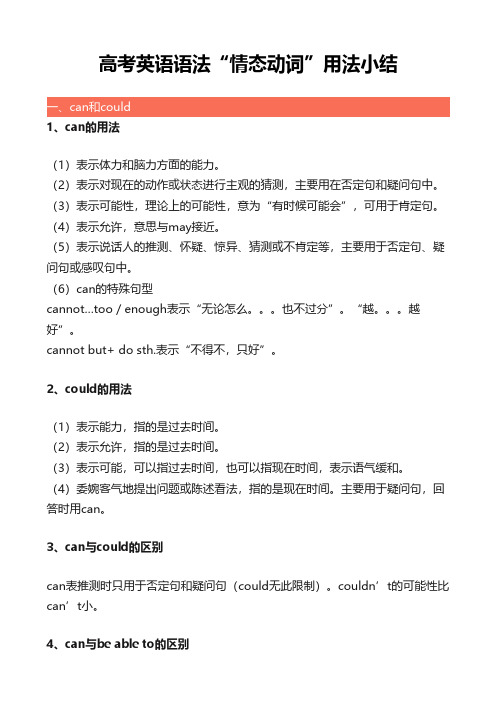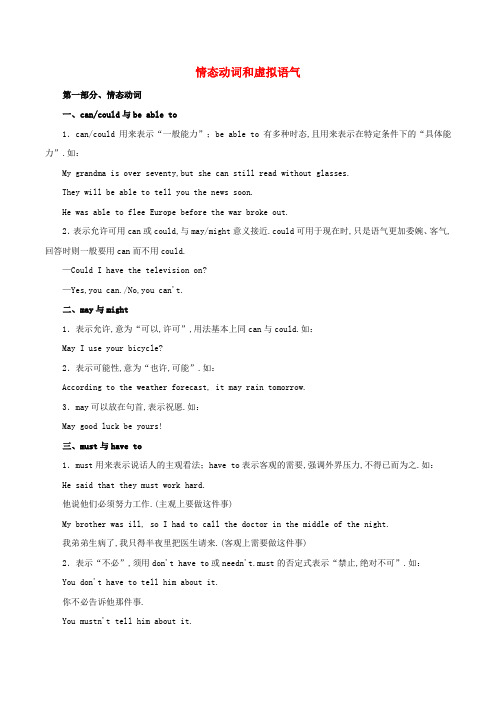高三英语情态动词2
高考英语第二轮复习情态动词_教学资料

看高考试题,学情态动词情态动词主要用来表示说话人的情感、态度等,是中学英语语法的重点,也是高考的热点,是单项填空必考的一个知识点。
情态动词在近五年高考中主要考查四点:情态动词表示推测和可能性的用法;情态动词与虚拟语气;情态动词的表达“情感、态度、语气等”,情态动词表示“必要性”等方面的用法。
请看近五年有关情态动词与虚拟语气考点分布表:二、情态动词试题的突破方法:(1) 学生首先从整体上把握情态动词的语法和语义特征。
(2) 逐个学习,了解每个情态动词的用法特征,尤其要熟练掌握一些常用或常考情态动词的基本用法并认真区别具有相同功能的、意思相近的情态动词的用法。
(3) 收集并熟练掌握真实的口语材料和近几年高考有关情态动词的试题,在真实的语境中去体会、领悟、印证、掌握情态动词的用法特征和常见考点。
三、情态动词的解题技巧:(2) 认真思考所给选项中情态动词的基本特征和用法,并结合语境推敲答案。
(3) 要注意把握时间概念。
情态动词无论是表达“推测和可能性”,还是表达“虚拟”这一概念,只要是对过去已经发生的事情进行描述,一律用“情态动词+have done”这一结构;对现在或将来的事情进行描述,用“情态动词+动词或系动词原形”。
例如:(NMET山东,24)Thank you for all your hard work last week. I don’t think we ______ it without you.A. can manageB. could have managedC. could manageD. can have managed根据题干中所给出的时间last week可知我们已经做完了工作,已经完成,故排除A、C 两项,再结合could have done表示虚拟语气以及与前面的I don’t think…,故说话者想表达的意思是:离开了你,我们本不可能完成这项工作。
故答案为B项。
四、情态动词用法归类与高考试题分析:(一)表示推测的情态动词对现在或将来情况推测,用情态动词+do / be / be doing…;对过去的推测,用情态动词+have done / been…;表示肯定推测的情态动词按可能性大小依次为must, should / ought to, may, might, could;否定推测,常用can’t / couldn’t,译为“根本不可能”、“想必不会”,表示推测的语气非常肯定,may not, might not或could not译为“可能不”、“也许不”,表示推测的语气不很肯定。
高考英语语法复习情态动词和虚拟语气

4
5. Should I open the window? 我可以开窗户吗? 6. You shouldn't be sitting in the sun. 你不应该坐在阳光下。
4
7. It's 4:30. They should be in New York by now. 现在是4点半,他们应该到达纽约了。 8. If he should drop in, give him my message. 他若来访,就将我的消息给他。
(2)He shall be punished if he disobeys. 你照我的样子办。
他若不服从就要受到处罚。
4
3. (1)You shall have my answer tomorrow. (2)She shall get her share. (1)你明天可以得到我的答复。
(2)她可以得到她的一份。 4. (1)Shall I get you some coffee, Miss Fleure?
除了 can , would 以外,英语中还有很多情态动 词 。 常 见 情 态 动 词 有 : must , can(could) , may(might) , ought to , need , dare shall(should) , will(would) have (had) to,used to, had better,would rather。 注意:need,dare也可用作实义动词。
6
4. May you succeed.
祝你成功。
5. (1)You may well say so.
高中英语语法讲解: 情态动词

高中英语语法讲解:情态动词概述1.共有10个情态动词:can/could, may/might, will/would, shall, should, ought to, must;2个半情态动词need, dare2.特点:(1)情态动词后加动词原形(即不带to的不定式)一起构成谓语;(2)没有人称和数的变化;(3)多数情态动词有过去式,但其过去式有时并不表示时态,而只起“委婉或不确定语气”的作用。
Would you do me a favour? She may/might be watering the flowers now.3.情态动词在句子中可发挥不同作用,如表能力,表责任与义务,表推测,表征求允许,表请求,表建议,表语气态度等等He can/could run 100 meters in 11 seconds.You should/ought to/must work hard to win a gold medal.Can/Could/May/Might I watch the Olympics tonight?Will/Can/Could/Would you help me with my training?He might/may/could/should/ought to/will/must watch the football match tonight.I suggest that you should watch the opening ceremony.Can this be true?4.情态动词+do 表对一般现在或将来情况的推测情态动词+ be doing 表对正在发生的事情的推测情态动词+have done 表对过去已经发生的事情的推测一、can/could 的用法1.表能力(1) can do现在一般的能力(2) could do过去一般的能力(3) could have done过去有能力做但没做具体某事(4)was/were able to do = managed to do/ succeeded in doing 过去有能力做且做了具体某事。
高考英语情态动词知识点全集汇编及答案(2)

高考英语情态动词知识点全集汇编及答案(2)一、选择题1.—I phoned you yesterday morning. A girl answered, but I didn’t recognize the voice.—Oh, it ________ my younger sister. She was in my room at that moment.A.must have been B.should have beenC.could have been D.may have been2.What a pity! Considering his ability and experience, he ___________ it better.A.need have done B.must have doneC.can have done D.might have done3.—Look at these tracks. It ________ be a wolf. I’m sure about it.—You are right! We have to be careful.A.may B.must C.can’t D.shouldn’t 4.—Where is my dictionary?I remember I put it here yesterday.—You___it in the wrong place.A.must put B.should have putC.might put D.might have put5.For all of the diligent students here, I give you my promise: Work hard, and you ________ be rewarded!A.can B.need C.shall D.could6.She is shy and ________ the teacher’s question.A.dares not answer B.doesn’t dare to answerC.dare not to answer D.dares not to answer7.You ________ give me a lift. I want to walk home for exercise.A.needn’t B.couldn’t C.can’t D.mustn’t8.—It’s so hot and uncomfortable here! Why are your windows still closed?—Oh, I’m not to blame. They ________ open.A.shan’t B.mustn’t C.won’t D.wouldn’t9.--Is Jack still in hospital?--Yes. He _________ the bad food.A.wouldn’t eat B.shouldn’t eatC.wouldn’t have eaten D.shouldn’t have eaten10.I didn’t hear the phone. I ___ asleep.A.must be B.must have beenC.should be D.should have been11.Peter searched all the places where he________have left her iPad but it was all in vain. A.might B.would C.must D.should 12.—Can I pay the bill by check?—Sorry,sir.But it is the management rules of our hotel that payment _____ be made in cash.A.shall B.needC.will D.can13.It ___________ last night, for the road was very muddy.A.would have rained B.must have rained C.should have rained D.must rain14.He did not regret saying what he did but felt that he _________ it differently.A.could express B.would expressC.could have expressed D.must have expressed15.She looks very happy. She_________ the exam.A.can have passed B.should have passed C.must have passed D.could have passed 16.—Do you know where David is? I couldn’t find him anywhere.— Well. He ________ have gone far — his coat is still here.A.shouldn’t B.mustn’t C.can’t D.wouldn’t 17.The lady ________ have done something wrong, because she is looking guilty.A.would B.should C.can D.must18.You _________ me about it earlier, but you didn't.A.should have told B.would have toldC.must have told D.should tell19.—Can I inform my best friends of the result?—No, I want to keep it a secret . You ____tell anyone.A.won't B.don't have to C.mustn't D.don't need to20.I _________ my driving test but I didn’t operate carefully.A.should pass B.may passC.might have passed D.might pass21.Word that you _________ enjoy a three-day holiday has come if you do complete the task on time.A.may B.should C.could D.shall22.—Is there a holiday recently?—There_____ be. It has been informed that we will continue to study for another three weeks. A.won’t B.mustn’t C.may not D.can’t23.—Do you know where Tony is?—He _________ in the living room. I saw him there just now.A.shall be B.should have been C.might have been D.must be 24.—Sorry, Mum! I failed the job interview again.—Oh, it's too bad. You________ have made full preparations.A.must B.can C.would D.should25.I ______my examination easily but I made too many stupid mistakes.A.should pass B.could have passedC.had passed D.must have passed【参考答案】***试卷处理标记,请不要删除1.A解析:A【解析】【分析】【详解】考查情态动词。
高考英语语法“情态动词”用法小结

高考英语语法“情态动词”用法小结1、can的用法(1)表示体力和脑力方面的能力。
(2)表示对现在的动作或状态进行主观的猜测,主要用在否定句和疑问句中。
(3)表示可能性,理论上的可能性,意为“有时候可能会”,可用于肯定句。
(4)表示允许,意思与may接近。
(5)表示说话人的推测、怀疑、惊异、猜测或不肯定等,主要用于否定句、疑问句或感叹句中。
(6)can的特殊句型cannot…too / enough表示“无论怎么。
也不过分”。
“越。
越好”。
cannot but+ do sth.表示“不得不,只好”。
2、could的用法(1)表示能力,指的是过去时间。
(2)表示允许,指的是过去时间。
(3)表示可能,可以指过去时间,也可以指现在时间,表示语气缓和。
(4)委婉客气地提出问题或陈述看法,指的是现在时间。
主要用于疑问句,回答时用can。
3、can与could的区别can表推测时只用于否定句和疑问句(could无此限制)。
couldn’t的可能性比can’t小。
4、can与be able to的区别(1)现在时:无区别,但后者不常用。
(2)完成时;can没有完成时,此时要用have(has,had)been able to。
(3)将来时:can没有将来时,要用will be able to。
(4)过去时:could表示一般能力,was/were able to 表示在具体场合通过努力成功做成某事的能力。
1、may的用法(1)表示询问或说明一件事可不可以做。
(2)表示一件事或许会发生或某种情况可能会存在,通常用在肯定句和否定句中。
注意:表示可能性时,can’t语气强,表示“不可能”,may not语气弱,表示“可能不”。
2、might的用法(1)表示询问或允许,指的是过去时间。
(2)表示可能发生的事,可以指过去时间,也可以指现在时间,语气更加不肯定,可能性比may小一些。
3、may与might的特殊用法(1)“may+主语+动词原形”表示祝愿。
高考英语二轮复习情态动词和虚拟语气考点讲解含解析

情态动词和虚拟语气第一部分、情态动词一、can/could与be able to1.can/could用来表示“一般能力”;be able to有多种时态,且用来表示在特定条件下的“具体能力”.如:My grandma is over seventy,but she can still read without glasses.They will be able to tell you the news soon.He was able to flee Europe before the war broke out.2.表示允许可用can或could,与may/might意义接近.could可用于现在时,只是语气更加委婉、客气,回答时则一般要用can而不用could.—Could I have the television on?—Yes,you can./No,you can't.二、may与might1.表示允许,意为“可以,许可”,用法基本上同can与could.如:May I use your bicycle?2.表示可能性,意为“也许,可能”.如:According to the weather forecast, it may rain tomorrow.3.may可以放在句首,表示祝愿.如:May good luck be yours!三、must与have to1.must用来表示说话人的主观看法;have to表示客观的需要,强调外界压力,不得已而为之.如:He said that they must work hard.他说他们必须努力工作.(主观上要做这件事)My brother was ill, so I had to call the doctor in the middle of the night.我弟弟生病了,我只得半夜里把医生请来.(客观上需要做这件事)2.表示“不必”,须用don't have to或needn't.must的否定式表示“禁止,绝对不可”.如:You don't have to tell him about it.你不必告诉他那件事.You mustn't tell him about it.你绝不能告诉他那件事.—Must we do it now?我们必须现在做吗?—No, you needn't.不,你们不必.四、shall1.用于第一、第三人称的疑问句中,用来征求对方的意见或请求指示.如:What shall he do next?他下一步干什么呢?2.用于第二、第三人称的陈述句中,表示说话人的意愿,有“命令、警告、允诺、威胁、强制”等意思.如:He shall stay in bed.他必须躺在床上.You shall have it back next week.下周一定还你.He says he won't go, but I say he shall.他说他不去,但我说他必须去.五、will与would1.will用于各种人称,表示“意志、意愿”或“决心”等.如:If you will keep your watch half an hour slow, it is hardly surprising that you are late for your appointments.如果你想要让你的表慢半个小时,你约会时迟到就不足为怪了.2.will表示习惯性的动作,有“总是,惯于”的含义.如:An Englishman will usually show you the way in the street.英国人通常是会在街上给你指路的.3.would可表示过去反复发生的动作.如:On Sundays he would get up early and go fishing.星期天他总是早起去钓鱼.六、should与ought to1.should表示“建议”或“劝告”,有“应该”之意.如:You should learn from each other.2.ought to表示根据某种义务或必要“应当”做某事.如:Everyone ought to obey the traffic regulations.3.should和ought to也可用来表示推测,意为“想必会……”.如:—When can I come for the photos? I need them tomorrow afternoon.—They should be ready by 1200.七、情态动词表示推测1.can用于肯定句中表示客观的可能性,意为“有时会”;用于疑问句中可以表示推测,意为“可能”,有时表示一种惊讶的语气;用于否定句中也可以表示推测,can't意为“不可能”,语气很强烈.It is usually warm in my hometown in March, but it can be rather cold sometimes.我的家乡在三月份通常很暖和,但有时候也会相当冷.Mr. Bush is on time for everything. How can it be that he was late for the meeting?布什先生做什么事情都很准时,他怎么可能开会迟到呢?—Let's visit Tom together, Stephen.—There's no need to do so. He can't be at home, because I saw him board the flight to Beijing this morning.——Stephen,咱们一起拜访汤姆吧.——没必要这样做.他一定不在家,因为今天早晨我看见他登上了飞往北京的航班.2.may/might用于肯定句中可以用来表示不十分肯定的推测,意为“有可能”;用于否定句中也可以表示推测,may not意为“可能不”,表示一种不太确定的语气.The traffic is heavy these days. I might arrive a bit late, so could you save me a place?这些天交通很繁忙,我可能会来晚一点,请你帮我保留个位置好吗?3.must表示推测时只能用于肯定句中,意为“一定,必定”,表示十分肯定的语气(在疑问句中或否定句中要用can/could).—It's the office! So you must know eating is not allowed here.—Oh, sorry.——这是办公室!所以你一定知道这里不许吃东西.——噢,对不起.4.should用来表示推测时意为“应该”,即含有“按道理来说应当如此”的意思.There shouldn't be any difficulty about passing the road test since you have practiced a lotin the driving school.因为你在驾校训练了这么多,通过路考应该没什么困难.八、“情态动词+have done”结构1.should/ought to+have done,表示“过去本应该做而(实际)没有做的事情”,含有责备或遗憾的语气,意为“本应该……”.其否定形式为“should not/ought not to have+done”,表示某种行为本不该发生但实际上发生了.I shouldn't have watched that movie—it'll give me horrible dreams.我本不应该看那部电影——它会令我做噩梦.You ought to have come to the party yesterday, but why didn't you come?昨天你本来应该参加聚会的,可是你为什么不来?2.must+have done,用于肯定句,表示“过去一定做过某事”,表示一种很有把握的推测.注意,对过去发生的情况的否定推测常用“can't/couldn't+have done”表示.—Ye Shiwen won two gold medals in London Olympic Games.—She must have gone through tough training.——叶诗文在伦敦奥运会获得了两枚金牌.——她肯定受到严格的训练.—Do you know where David is? I couldn't find him anywhere.—Well. He can't have gone far—his coat's still here.——你知道大卫在哪里吗?我到处找不到他.——大卫的上衣还在这里,因此他肯定没走远.3.needn't+have done,表示“过去没有必要做某事,但实际上做了某事”.Mark needn't have hurried. After driving at top speed, he arrived half an hour early.马克本没必要那么匆忙.他以最快速度开车,结果早到了半个小时.4.may/might+have done,表示对过去情况的一种不太有把握的可能性的推测,表示“可能已做了某事……”,否定句表示“可能还没有……”.Sorry, I'm late. I might have turned off the alarm clock and gone back to sleep again.对不起,我迟到了.我可能把闹钟关掉后又睡着了.5.could+have done表示“过去本来可以做某事,但实际上没有做”;can/could+have done表示“过去可能做了某件事”.I could have saved the poor rabbit, but I didn't have the right drugs with me at that moment.我本来可以拯救那只可怜的兔子的,可是我当时没有合适的药品.第二部分、虚拟语气一、虚拟语气在虚拟条件句中的用法1.在具体运用中,条件从句中有时可省略if而采用倒装结构.如:Had it not been for your help, we wouldn't have achieved so much.2.介词without/but for、连词but、副词otherwise常用来表示某种假设条件.如:I wouldn't have made such rapid progress without your help.3.有时候从句动作和主句动作发生的时间不一致,这时谓语动词的形式要根据各自的时间来调整.如:If the weather had been more favourable, the crops would be growing still better.二、“should+动词原形”表示的虚拟语气这一类型常见词有“一坚持(insist)、二命令(order, command)、三建议(advise, suggest, propose)、四要求(request, require, demand, desire)”.以上词及其派生名词所接的名词性从句都使用“(should +)动词原形”的虚拟语气.①Jane's pale face suggested that she was ill, and her mother suggested that she(should) havea medical examination.简苍白的脸色表明她病了,她母亲建议她去检查身体.②She insisted that the man had stolen her car and that he(should) be sent to prison.她坚持说那个男人偷了她的车,并坚决要求他坐牢.三、特殊句式中的虚拟语气If only/It's (high) time (that)...wish/would rather/as if等固定句式要求用相应的虚拟语气表达形式.①I wish I could fly.真希望我能飞.②I would rather you came tomorrow.我宁愿你明天来.③If only I had taken your advice!要是听从了你的建议该多好啊!高频考点一、考查情态动词例1.(2018·北京卷)In today’s information age, the loss of data _________ cause serious problems for a company.A. needB. shouldC. canD. must【答案】C【解析】考查情态动词.句意:在今天的信息时代,数据的丢失有时会对一个公司造成严重的问题.数据丢失造成严重问题是客观上会发生的情况,即“客观可能性”,故该空应用情态动词can.C选项正确.其余情态动词均没有该用法.need需要;should应该,竟然;must必须,肯定.【变式探究】—Can’t you stay a little longer?—It’s getting late. I reall y _____go now, My daughter is home alone.A .mayB .canC . mustD .dare【答案】C【解析】句意:——你不能再多待会儿吗?——很晚了,我必须得走了.我女儿一个人在家.A. may可能,可以,也许;B. can能,会;C. must必须,必然要,必定会;D. dare敢,胆敢.结合句意,故选C.【变式探究】________ I have a word with you? It won’t take long.A. CanB. MustC. ShallD. Should【答案】A【解析】本题考察的是情态动词基本意义辨析.Can能够,可能;must必须,一定;非得;shall将要;should应该;句意:我可以和你谈谈吗?不会花很多时间的.根据句意可知本题使用can I…?表示询问对方是否允许.如:Can I use your dictionary?我可以使用你的字典吗?故A正确.高频考点二、考查情态动词的用法例2. (2018·天津卷) I can't find my purse. I___________ it in the supermarket yesterday, but I'm not sure.A. should leaveB. must have leftC. might leaveD. could have left【答案】D【解析】考查情态动词表推测.句意:我不能找到我的钱包了,昨天我有可能把它落到超市了,但我不确定.根据句中时间状语yesterday可知,是对过去事情的推测,故用情态动词+ have done,再根据后句but I’m not sure.可知,此推测为不能肯定的推测,故用情态动词could,表示“可能”.故选D.【变式探究】(2017•天津)My room is a mess, but I __________clean it before I go out tonight.I can do it in the morning.A. daren’tB. shouldn’tC. needn’tD. mustn’t【答案】C【解析】句意:我的房间很乱,但是在今晚我出去之前不需要打扫,我可以明天早晨再打扫.A.不敢;B.不应该;C不需要;D.不许.根据句意,故选C.【变式探究】Why didn't you tell me about your trouble last week?If you ________(tell)me,I could have helped.【答案】had told【解析】句意:上个星期你为什么不告诉我你的麻烦事?如果你告诉我了,我就能帮你.根据句意和相关信息判断,条件句表示与过去事实相反的假设,此时从句用过去完成时,主句谓语用“情态动词+have done”形式.【变式探究】I ______ have worried before I came to the new school, for my classmates here are very friendly to me.A. mightn’tB. mustn’tC. needn’tD. couldn’t【答案】C【解析】句意:我来新学校之前本没有必要担心,因为在这里我的同学对我非常友好.needn’t have done本没有必要做某事,表示实际上已经做了某事.根据句意可知选C.高频考点三、考查虚拟语气例3.(2019·天津卷)The workers were not better organized, otherwise they ________ the task in half the time.A.accomplished B.had accomplishedC.would accomplish D.would have accomplished【答案】D【解析】考查虚拟语气.句意:工人们没有被组织好,否则的话他们会用那一半的时间完成任务的.此处otherwise表达了一种含蓄虚拟;otherwise前的内容所述的是过去的事实,相当于if引导的条件状语从句“If the workers had been better organized”,因此后半部分应用“主语+would have done sth.”的结构.故选D.【举一反三】【2018·江苏】It’s strange that he _______have taken the books without the owner’s permission.A. wouldB. shouldC. couldD. might【答案】B【解析】考查虚拟语气.句意:真奇怪,他竟然没有主人的允许就拿走了这些书.在句型”It is important/necessary/strange/impossible/natural that...”中,其中由that引导的主语从句通常用“should+动词原形”这样的虚拟语气,其中的should可以省略.故选B.【变式探究】(2017·北京)If the new safety system _______ to use, the accident would never have happened.A. had been putB. were putC. should be putD. would be put【答案】A【解析】句意:如果这个新的安全系统被投入使用过的话,这个事故就不会发生了.根据主句确定是对过去情况的虚拟,所以从句谓语用had done形式,此外根据句意可知是被动,用被动语态,故A项是正确的.【变式探究】________(have)the governments and scientists not worked together,AIDSrelated deaths would not have fallen since their highest in 2005.【答案】Had【解析】句意:如果政府和科学家不共同努力,与艾滋病相关的死亡就不会从2005年的最高点下降.这是一个省略了从属连词if的虚拟语气句,使用了倒装句式.根据主句的would not have fallen可知,这里是表示过去的虚拟语气,所以用had.【变式探究】Without his wartime experiences, Hemingway____ his famous novel A Farewell to Arms.A.didn’t writeB. hadn’t writtenC. wouldn’t w riteD. wouldn’t have written【答案】D【解析】句意:没有他战时的经验,海明威就不可能写出著名的小说永别了武器.根据without his wartime experience没有战时的经历,可知表示对于过去的否定猜测,故主句用would have done,因此选D 项.1.(2019·天津卷)The workers were not better organized, otherwise they ________ the task in half the time.A.accomplished B.had accomplishedC.would accomplish D.would have accomplished【答案】D【解析】考查虚拟语气.句意:工人们没有被组织好,否则的话他们会用那一半的时间完成任务的.此处otherwise表达了一种含蓄虚拟;otherwise前的内容所述的是过去的事实,相当于if引导的条件状语从句“If the workers had been better organized”,因此后半部分应用“主语+would have done sth.”的结构.故选D.2.(2019·江苏卷)What a pity! You missed the sightseeing, or we ________ a good time together.A.had B.will haveC.would have had D.had had【答案】C【解析】考查虚拟语气.句意:多么遗憾!你错过了这次游览.否则,我们就可以一起度过一段愉快的时光.根据关键词or可知,这里表示与过去的事实相反,谓语动词应用would/could/should/might+have done.1.【2018·江苏】 There is a good social life in the village, and I wish I _______ a second chance to become more involved.A. hadB. will haveC. would have hadD. have had【答案】A【解析】考查虚拟语气.句意:在这个村里有很好的社交生活,并且我希望我再有机会去更多的参与.本题考查wish引导的宾语从句,表示与现在事实相反的愿望,所以从句用一般过去时.故选A.2.【2018·江苏】It’s strange that he _______have taken the books without the owner’s permission.A. wouldB. shouldC. couldD. might【答案】B【解析】考查虚拟语气.句意:真奇怪,他竟然没有主人的允许就拿走了这些书.在句型”It isimport ant/necessary/strange/impossible/natural that...”中,其中由that引导的主语从句通常用“should+动词原形”这样的虚拟语气,其中的should可以省略.故选B.3.(2018·天津卷) I can't find my purse. I___________ it in the supermarket yesterday, but I'm not sure.A. should leaveB. must have leftC. might leaveD. could have left【答案】D【解析】考查情态动词表推测.句意:我不能找到我的钱包了,昨天我有可能把它落到超市了,但我不确定.根据句中时间状语yesterday可知,是对过去事情的推测,故用情态动词+ have done,再根据后句but I’m not sure.可知,此推测为不能肯定的推测,故用情态动词could,表示“可能”.故选D.4.(2018·北京卷)In today’s information age, the loss of data _________ cause serious problems for a company.A. needB. shouldC. canD. must【答案】C【解析】考查情态动词.句意:在今天的信息时代,数据的丢失有时会对一个公司造成严重的问题.数据丢失造成严重问题是客观上会发生的情况,即“客观可能性”,故该空应用情态动词can.C选项正确.其余情态动词均没有该用法.need需要;should应该,竟然;must必须,肯定.5.(2018·北京卷)They might have found a better hotel if they _________ a few more kilometers.A. droveB. would driveC. were to driveD. had driven【答案】D【解析】考查虚拟语气.句意:如果他们多开几公里的话,他们也许会找到一个更好的旅馆.由“they might have found a better hotel”可知,该句是表示对过去的虚拟.if ____ a few more kilometers是条件句部分,表示对过去的虚拟,条件句部分要用过去完成时态,故D选项正确.1.(2017·北京)Samuel, the tallest boy in our class, ______ easily reach the books on the top shelf.A. mustB. shouldC. canD. need【答案】C【解析】A. must 必须 B. should 应该 C. can 能 D. need 需要.句意:Samuel,我班最高的男生,能很轻松地够着书架顶上的书,此处需要一个表示能力的词,故用can,答案为C.2.(2017•天津)My room is a mess, but I __________clean it before I go out tonight. I can do it in the morning.A. daren’tB. shouldn’tC. needn’tD. mustn’t【答案】C【解析】句意:我的房间很乱,但是在今晚我出去之前不需要打扫,我可以明天早晨再打扫.A.不敢;B.不应该;C不需要;D.不许.根据句意,故选C.3.(2017•江苏) _______ not for the support of the teachers, the student could not overcome her difficulty.A. It wereB. Were itC. It wasD. Was it【答案】B【解析】考查虚拟语气和倒装.虚拟语气中,be动词统一用were;虚拟语气的省略形式主要是把if省略,同时把were/should/had提前,即Were /Should/ Had I...,故选B.句意:要不是老师们的支持,该生是无法克服她自己的困难的.4.(2017·江苏卷) ____________ not for the support of the teachers, the student could not overcome her difficulty.A. It wereB. Were itC. It wasD. Was it【答案】B【解析】考查虚拟语气的省略.虚拟语气中,be动词统一用were;虚拟语气的省略形式主要是把if省略,同时把were/should/had提前,即Were /Should/ Had I...,故选B.5.(2017•江苏) _______ not for the support of the teachers, the student could not overcomeher difficulty.A. It wereB. Were itC. It wasD. Was it【答案】B【解析】考查虚拟语气和倒装.虚拟语气中,be动词统一用were;虚拟语气的省略形式主要是把if省略,同时把were/should/had提前,即Were /Should/ Had I...,故选B.句意:要不是老师们的支持,该生是无法克服她自己的困难的.6.(2017·北京)If the new safety system _______ to use, the accident would never have happened.A. had been putB. were putC. should be putD. would be put【答案】A【解析】句意:如果这个新的安全系统被投入使用过的话,这个事故就不会发生了.根据主句确定是对过去情况的虚拟,所以从句谓语用had done形式,此外根据句意可知是被动,用被动语态,故A项是正确的.1.(2016·浙江,15)________(have)the governments and scientists not worked together,AIDSrelated deaths would not have fallen since their highest in 2005.【答案】Had【解析】句意:如果政府和科学家不共同努力,与艾滋病相关的死亡就不会从2005年的最高点下降.这是一个省略了从属连词if的虚拟语气句,使用了倒装句式.根据主句的would not have fallen可知,这里是表示过去的虚拟语气,所以用had.2.(2016·浙江,17)George can't ________(go)too far.His coffee is still warm.【答案】have gone【解析】句意:乔治不可能走得太远了.他的咖啡仍然是温的.can't have done是对过去的否定推测.3.(2016·北京,34)Why didn't you tell me about your trouble last week?If you ________(tell)me,I could have helped.【答案】had told【解析】句意:上个星期你为什么不告诉我你的麻烦事?如果你告诉我了,我就能帮你.根据句意和相关信息判断,条件句表示与过去事实相反的假设,此时从句用过去完成时,主句谓语用“情态动词+have done”形式.。
高考英语情态动词用法详解
高考英语情态动词用法详解,想要满分的看过来情态动词的区分情态动词可以广泛分为四大类。
第一类只能做情态动词,包括may、might、must等。
第二类既能做情态动词,又能做实义助词,包括need、dare、can等。
第三类既能做情态动词,又能做助动词,包括shall、should、will、would等。
第四类是指具有情态动词特征的短语,包括have to、used to、ought to等。
Can/could通常代表许可的意思,能够广泛用于肯定句、否定句和疑问句中,而且could的表达效果通常要更加委婉。
Cannot是指“禁止”,通常用于警告和告示。
May/might的意思与can/could相似,用法也没有明显区别,不过其与后者相比大多用于正式文体,通常含有尊敬之意,其中,might较may表达的效果更加委婉,但不是很常用。
Shall通常用于表示征求意见,常用于疑问句中。
而will/would同样是表示请求,其中would的表达效果更为客气委婉,且大多用于第二人称。
Must则是表示必须、必要。
情态动词的用法重点学习:will ( would), can (could), may (might)。
will 1.客观情形主语自己不能做决定,不要受客观情形支配。
如I will be 18 years old next month. 下个月我就要18岁了。
这里的will和将来时态连用表明是受时间客观规律支配的,不以主观意志来做主的。
因此可以和一个词组be going to do 区别开来。
be going to do 也是将要的意思,用法和will有很大区别。
当be going to do 的主语是人的时候,意思为“打算,计划”;只有当其主语是物的时候才可以和will等同表示马上要发生,但是依然不可以用于表示自然规律的情形。
It is going to rain soon.= It will rain soon. 马上就要下雨了。
高考英语语法词汇专项突破:02情态动词用法考点扫描+巩固练习+答案
高考英语语法词汇专项突破:02情态动词用法考点扫描+巩固练习+答案【要点速览】一、表力量的情态动词;二、表推想的情态动词;三、表必需的情态动词;四、表恳求允许的情态动词;五、表示对已经发生的事情的推想、责怪、懊悔、圆满等情态动词结构【高考真题呈现】【考例1】(2021年天津卷第一次)It used to be that you ___drive for miles here without seeing another person, but now there are houses and people everywhere.A.need B.should C.could D.must答案与解析:C。
考查情态动词推想功能。
A. need 需要;B. should 应当,理应如此;C. could 可能,表示对客观可能性的推想;D. must 肯定,必需。
依据前半句意思可知,表示的是对客观可能性的推想。
故选C。
句意:以前你可能在这里开了几英里,都没见过别人,但现在处处都是房子和人。
【考例2】(2021年天津卷其次次)---I honestly don't think I'm going to be admitted.---Wel1, you never know! You________ a better impression than you think.A. may have madeB. should have madeC. couldn't have madeD. needn't have made答案与解析:A。
考查情态动词推想用法。
A.may have made 可能;B.should have made本应当做;C.couldnt have made不行能做;D.needn't have made本不必做。
依据句意可知,此处表示的是有可能,故选A。
(完整版)高考情态动词讲解
语法专题(三)情态动词考点归纳考点一:情态动词表示能力1.表现在的或一般的能力:表示现在的或一般的能力用can或be able to,can 比be able to 使用得更普遍。
can 侧重指有能力做某事;而be able to更强调通过努力、克服困难做成某事。
A computer can't think for itself ;it must be told what to do.He is a native speaker of English,so he can of course speak English quite well.2.表示将来的能力:表示将来能力用will be able to。
If you have a good sleep,you will be able to work out this problem.如果你睡个好觉,你就能做出这道题。
3.表示过去的能力:could 表示过去一般的能力,即不表示做或未做某事;而was (were) able to do则表示过去有能力并且成功地做了某事,相当于managed to do something/succeeded in doing somethin。
g考点二:情态动词表示推测(可能性)可能性可分为客观的(理论的)可能性和具体事情实际发生的可能性。
1.客观的(理论的)可能性指并不涉及具体某事是否会发生,此种用法常常可以说明人或事物的特征。
can 用于肯定句中表示客观的(理论的)可能性,can用于疑问及否定句中则表示实际发生的可能性。
The World Wide Web is sometimes jokingly called the World Wide Wait because it can be very slow.A left- luggage office is a place where bags can be left for a short time,especially in a railway station.2.表示具体事情实际发生的可能性:表示具体事情实际发生的可能性的这些词后接动词原形是对现在事情的推测,后接完成式则表示对过去事情的推测;其中can,may/might,should,ought to,must 有时还可接进行时表示对现在正在进行的事情的推测。
高考英语新情态动词知识点知识点总复习附答案(2)
高考英语新情态动词知识点知识点总复习附答案(2)一、选择题1.One of our rules is that every student _______ wear school uniform while at school. A.might B.couldC.shall D.will2.Schools have been lengthening the school day to raise test marks, which ________ be costly if schools need air conditioning on hot days.A.might B.can C.dare D.need3.What a pity! Considering his ability and experience, he ___________ it better.A.need have done B.must have doneC.can have done D.might have done4.——I called you last night, but no one answered.——Sorry, I____________ sleeping.A.need have been B.would have been C.must have been D.should have been 5.Home is not just the place where you grow up. It ________ be a warm smile, a sincere hug, and a shoulder for you to cry on.A.must B.can C.will D.should6.She is shy and ________ the teacher’s question.A.dares not answer B.doesn’t dare to answerC.dare not to answer D.dares not to answer7.You ________ give me a lift. I want to walk home for exercise.A.needn’t B.couldn’t C.can’t D.mustn’t8.I didn’t hear the phone. I ___ asleep.A.must be B.must have beenC.should be D.should have been9.—Isn’t that Ann’s husband over there?— No, it ________ be him —I’m sure he doesn’t wear glasses.A.must not B.can’t C.won’t D.may not 10.Hurry up! Tom _______ for us at the gate.A.must wait B.must be waitingC.can be waiting D.must have waited11.—Is Robert coming by coach?—He should, but he ___________ not. He likes driving his car.A.may B.could C.need D.must12.—I can’t think why he________ so angry. I mean no harm.—It’s typical of him to be sensitive(敏感的).A.should have been B.must have beenC.might have been D.can have been13.He didn’t follow the doctor’s suggestions as required, but he _________.A.ought B.ought to C.ought to be D.ought to have14.—May I smoke here?—If you _______, choose a seat in the smoking section.A.must B.should C.may D.can15.Helen________ go on the trip with us, but she isn’t quite sure yet.A.shall B.may C.must D.can16.The lady ________ have done something wrong, because she is looking guilty.A.would B.should C.can D.must17.— Did Bob take the job in the supermarket? — No, but I think he _________.A.will have B.may have C.should have D.must have 18.We lost our way in that small village, otherwise we ________more places of interest yesterday.A.visited B.had visitedC.would visit D.would have visited19.—Can I inform my best friends of the result?—No, I want to keep it a secret . You ____tell anyone.A.won't B.don't have to C.mustn't D.don't need to 20.He plays basketball very well. He_________ it a lot.A.may practise B.must practiseC.must have practised D.should have practiced21.Word that you _________ enjoy a three-day holiday has come if you do complete the task on time.A.may B.should C.could D.shall22.As you worked late last night, you __________ have come this morning.A.may not B.can’t C.mustn’t D.needn’t 23.—Sorry, Mum! I failed the job interview again.—Oh, it's too bad. You________ have made full preparations.A.must B.can C.would D.should24.It was so noisy that we hear ourselves speak.A.couldn’t B.shouldn’tC.mustn’t D.needn’t25.Sir, you ____ be sitting in this waiting room. It is for women and children only. A.shouldn’t B.will C.won’t D.needn’t【参考答案】***试卷处理标记,请不要删除一、选择题1.C解析:C【分析】【详解】考查情态动词辨析。
- 1、下载文档前请自行甄别文档内容的完整性,平台不提供额外的编辑、内容补充、找答案等附加服务。
- 2、"仅部分预览"的文档,不可在线预览部分如存在完整性等问题,可反馈申请退款(可完整预览的文档不适用该条件!)。
- 3、如文档侵犯您的权益,请联系客服反馈,我们会尽快为您处理(人工客服工作时间:9:00-18:30)。
[单选]下列化学方程式或离子方程式正确的是()。A.常温下,将铁片置于浓硝酸中:Fe+6HNO3=Fe(NO3)3+3NO2↑+3H2OB.向氯化铵的稀溶液中加入少量NaOH:NH4++OH-=NH3↑+H2OC.向(NH4)2SO4溶液中加入适量Ba(OH)2:Ba2++SO42-=BaSO4↓D.向浓硝酸中加入铜片:Cu+4H++2NO3-= [单选,A1型题]关于药品标签和包装的说法,不正确的是()A.药品的标签应当以说明书为依据,其内容不得超出说明书的范围B.药品标签上不得印有暗示疗效、误导使用的文字和标识C.药品包装上可印有宣传产品的文字和标识D.药品标签上应有指导安全、合理用药的文字和资料E.供上市销售的 [单选]企业人员管理,属于员工流出管理的是()。A.平级调动B.岗位轮换C.解雇D.降职 [单选]()通过手指上的弯曲传感器、扭曲传感器和手掌上的弯度传感器、弧度传感器,来确定手及关节的位置和方向,从而实现环境中的虚拟手及其对虚拟物体的操纵。A.跟踪球B.数据手套C.头盔显示器D.立体眼镜 [判断题]气密试验是清除一些重大的隐患及质量问题,确保一次化工操作开车成功。A.正确B.错误 [单选,A1型题]尿道损伤后,有排尿困难,导尿管能插入膀胱,应将导尿管留置多久()A.10~14天B.1天C.3~4周D.5天E.5~6周 [单选]SET协议规范不涉及的对象主要是:()A.消费者B.收单银行C.认证中心DTS [单选,共用题干题]患者女,55岁,因“双膝关节肿痛3年,加重1个月”来诊。查体:双侧膝关节肿胀,伴双侧腘窝囊肿,关节局部无红,浮髌试验阳性。双膝关节X线检查呈退行性变。关节穿刺的目的不包括()。A.关节液细菌培养B.关节液引流减压C.关节液注射免疫抑制剂D.关节内注射激素E [判断题]为了预防、减少和避免学生伤害事故的发生,除应对学生加强安全意识和提高自我保护能力以及培养健康的心理素质外,还应对其强化纪律观念,尽量减少因自违纪行为而导致的伤害事故的发生。A.正确B.错误 [问答题,案例分析题]背景材料: [单选]牌号08F是:()。A.镇静钢B.半镇静钢C.沸腾钢 [单选]根据《建设工程质量管理条例》的规定,设计单位应当参与建设工程()分析,并提出相应的棱柱处理方案。A.工期延误B.投资失控C.质量事故D.施工组织 [名词解释]首尾垂线 [单选,A型题]各国的药典经常需要修订,中国药典是每几年修订出版一次A、2年B、4年C、5年D、6年E、8年 [问答题,案例分析题]男性,35岁。主诉:间断咳嗽、咳大量脓痰10年,加重2天入院。请针对该案例,说明问诊内容与技巧。 [多选]进出境邮寄物检疫的范围是()。A.动植物、动植物产品及其他检疫物的国际邮寄物品B.来自疫区的被传染病病体污染的或可能成为传染病传播媒介的国际邮寄物品C.微生物、人体组织、生物制品、血液及其制品等特殊物品的国际邮寄物品D.通过邮政渠道运递并需实施检疫的其他国际邮寄 [单选]某公民受某单位委托所开发的软件,则该软件的著作权属于()。A.著作权的归属由双方通过合同约定B.某公民与单位共享C.单位D.就著作权的归属合同未作明确约定或没有订立合同的,著作权属于某公民 [单选,A2型题,A1/A2型题]确定慢性粒细胞白血病最有意义的依据是().A.白细胞明显增高B.中性粒细胞碱性磷酸酶活性降低C.骨髓增生极度活跃D.Ph'染色体阳性E.贫血、脾肿大 [判断题]出入境旅客携带物的检验检疫,以现场检疫为主,其他检疫手段为辅。()A.正确B.错误 [单选]IBC规则适用于()建造的船舶。A.1984年9月1日及以后B.1987年4月6日及以后C.1986年7月1日及以后D.1980年5月25日及以后 [单选,A1型题]有关RNA的叙述,错误的是()A.tRNA是氨基酸的载体B.hnRNA主要存在于胞质C.rRNA参与核糖体组成D.mRNA具有多聚A尾结构E.mRNA分子中含有遗传密码 [单选]急性肾炎引起水肿的主要机理是()A.大量蛋白尿引起的低蛋白血症B.高血压引起的心力衰竭C.醛固酮增多引起的水钠潴留D.肾小球滤过率下降E.全身毛细血管通透性增加 [单选]经络的临床应用不包括()A.说明病理变化B.指导辨证归经C.指导针灸治疗D.说明气血状态E.指导药物归经 [单选]肺癌的早期症状是()A.食欲不振B.咳嗽、痰中带血C.大咯血D.持续性胸痛E.出现Horner综合征 [单选]ISDN可以何一个用户号码提供()业务.A.1种B.2种C.多种 [填空题]泵的运行工况点是()和()的交点。 [问答题,案例分析题]某智能大厦的一套设备系统有A、B、C三个采购方案,其有关数据见表2—1。现值系数见表2—2。【问题】 [单选]下列关于确定调查人员的说法有误的是()。A、要选派政策水平高、熟悉业务、组织协调能力强的人担任调查负责人B、要根据案件的具体情况、复杂程度来确定调查人员的数量C、特别重大案件,要请上级部门或其他单位的同志参与调查D、与被调查人有亲友关系或与案件有利害关系的办 [填空题]在公路中桩测量中碰到虚交时,应先解三角形,求出()的位置,然后再根据普通交点的敷设方法,计算曲线各要素桩。 [单选]银行信用基础上产生的短期信用工具是()A.银行票据B.公司债券C.股票D.投资基金 [单选,A1型题]染色体畸变的结构基础是()。A.缺失B.裂隙C.断片D.断裂E.转换 [单选]绒毛膜癌最主要的转移途径是()。A.直接转移B.淋巴道转移C.血道转移D.远处种植E.弥漫性播散 [单选]若串励直流电动机的负载发生变化,则()变化很大。A.端电压B.转速nC.效率ηD.功率p [名词解释]声级计 [多选]一般情况下,和易性包括以下含义()。A.流动性B.黏聚性C.保水性D.硬化性E.速凝性 [多选]发生劳动争议时,主要的证据包括()等A.工资签收单B.解聘函C.员工手册D.劳动合同. [单选]“春伤于风,邪气留连”而发生的病证是()。A.疟疾B.洞泄C.温病D.咳嗽E.濡泻 [问答题,案例分析题]背景材料: [单选,A2型题,A1/A2型题]MRI与CT相比较不具有优势的是()A.中枢神经系统疾病B.对纵隔及肺门淋巴结肿大,占位性病变的诊断C.肺内病变如钙化及小病灶D.半月板损伤E.关节软骨的变性与坏死 [单选,B型题]噪声聋指()。A.短时间暴露于强噪声,使听阈上升10~15dB,脱离噪声接触后数分钟内即可恢复正常B.较长时间暴露于强噪声,致使听阈上升超过15~30dB,脱离后需数小时至几十小时才能恢复C.已长期在强噪声环境中导致听力曲线在3000~6000Hz范围内出现"
